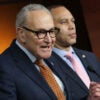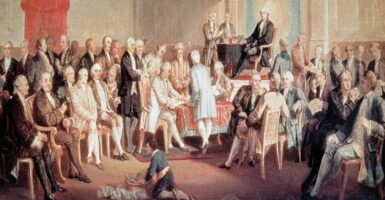A new book by Gordon S. Wood, the great historian of the Founding, details how Americans drafted, ratified, and incorporated written constitutions into their politics and government as fundamental laws.
“Instead of reforming the Articles [of Confederation], they throw them out and create an entirely new government—the federal Constitution that we have with us today, something that nobody in 1776 even imagined in their wildest dreams,” Wood observes of the Founders in talking about “Power and Liberty: Constitutionalism in the American Revolution.”
“I know of no one in 1776 that anticipated the kind of federal government that emerged 10 years later,” Wood adds. “Something awful had to happen in those 10 years to explain the Constitution. I find that it’s harder to explain the Constitution than it is to explain the Revolution itself.”
Wood joins this Saturday episode of “The Daily Signal Podcast,” where he also takes on the perversion of history by The New York Times’ discredited 1619 Project, which dates the Founding not to the events of 1776 but to the introduction of enslaved Africans in 1619.
“What’s interesting about the Revolution is that the Revolution makes slavery a problem for the first time in Western civilization and leads to a massive assault on the slave systems of the New World,” Wood says, adding:
The Northern states, almost immediately in 1776, mount a massive assault on slavery, which had been legal in all of these Northern states. By 1804, all the Northern states have abolished slavery, [becoming] the first states in the history of the world, or at least the modern world, to abolish slavery.
Listen to the podcast below or read the lightly edited transcript:
Richard Reinsch: It’s my honor to talk with Gordon Wood today about his new book “Power and Liberty: Constitutionalism in the American Revolution.” Gordon Wood is one of our master historians of the American founding. He’s the author of numerous books on the subject, books for which he has received numerous awards. I first started reading Gordon Wood’s scholarship my senior year in undergraduate studies.
His book “Creation of the American Republic,” published in 1969, won the Bancroft Prize. His book “Radicalism of the American Revolution,” published in 1992, won the Pulitzer Prize for History, along with the Ralph Waldo Emerson Prize. His book “Empire of Liberty: A History of the Early Republic” in 2009 was given the Association of American Publishers Award for History and Biography. And that list goes on and on. In 2011, he was awarded a National Humanities Medal by President [Barack] Obama and the Churchill Bell by Colonial Williamsburg.
Gordon Wood, we’re glad to have you on the program today.
Gordon Wood: I’m glad to be here.
Reinsch: Thinking about your new book “Power and Liberty: Constitutionalism in the American Revolution,” I’m thinking of it as, how did the Americans become a constitutional people? Maybe talk about the book and what you aim to do with it.
Wood: Well, constitutionalism was really, I think, modern constitutionalism was really set off by the American Revolution. When we think about creating constitutions, and we’ve created dozens of them since World War II throughout the world, they are written documents, and it’s the American experience that really made that fixed. There had been some written documents earlier, but generally speaking, people had not thought of constitutions in the way they think of them now, as a single written document. It’s the American experience.
In 1776, each of the states wrote out their constitution, and the federal Constitution, which occurred roughly 10 years later, was derived from those state constitutions. People write out constitutions because they’re frightened of power or they want to prescribe what could be done. Government needs to have guidelines of how much power it has, and so constitutions play that role. When you’re in doubt of your institutions, you want things down in black and white so that you can be sure that power does not encroach on liberty.
Reinsch: The English Constitution, famously, is unwritten. It’s composed of a lot of different elements, documents, practices, procedures within English constitutionalism. As you say, the colonists decide to write things down. There’s clearly some notion here that writing it down accomplishes something good in the development of liberty, but also how power could be created and yet cabined.
Wood: Yes, of course. The English had many written documents, going back to Magna Carta, which are part of the English Constitution. They had lots of documents in the 17th century, bills passed by Parliament, Habeas Corpus Act, and then finally the Bill of Rights of 1688, which in many respects anticipates our own Bill of Rights connected with the federal Constitution. Writing things down is common.
Of course, we have a written constitution, but we have a lot of unwritten constitutional practices as well. We couldn’t exist with this federal Constitution with, what, 8,000 words. We fill it in with all kinds of conventions and habits and practices. The British system has some written documents as well. That, I think, makes us more alike than I think many people think. What’s different, I suppose, is that the English have confidence in their system, that perhaps we’re not quite as confident as they are, in their practices and conventions.
Reinsch: Thinking about this book you’ve written, a revolution, leaving the mother country, fighting a war, and yet at the same time in your book you’re detailing how the Americans became a constitutional people, even after the Declaration of Independence. Maybe talk about this explosion of the state constitutions, revoking their colonial charters and putting forward new state constitutions. What’s going on there?
Wood: Yes. Well, I think that’s something we generally ignore. When we think of the Revolution and constitutionalism, we usually think of the federal Constitution, which, of course, occurred 10 years after the Declaration of Independence; but it’s the state constitutions that are really important. They’re the ones which embedded certain practices into our thinking. The separation of powers, the idea of bill of rights, all of these were attached to most of the state constitutions, which makes the federal Constitution derivative of what had been done 10 years earlier in the state constitutions.
The notion of separation of power is crucial. We forbid the simultaneous office-holding of legislators or judiciary from sitting in the executive. Of course, that forever forbids us from parliamentary Cabinet-responsible government, which is what the English model is.
I suppose the English model has been copied by more democracies than our own system of separation of powers, but it was the fear of corruption, the fear that the executive would buy off people in the legislature by appointing them to executive offices, that led to that prohibition that’s written into all the state constitutions and then written into the federal Constitution as well.
When Hillary Clinton, senator from New York, became secretary of state, she had to give up her office in the legislature. In England, she would have to maintain her office in the legislature if she were going to sit in the Cabinet. It’s that difference that was, I think, most pronounced in the state constitution-making of 1776.
Reinsch: You have a fascinating chapter in the book about the Articles of Confederation and the rejection of the Articles of Confederation. You also bring forward these problems existing under the Articles in the states, that it wasn’t the case that the Articles weren’t functioning well or was it not the case that these new state constitutions had themselves created problems that they were trying to account for with a stronger federal government that could regulate citizens directly. Maybe talk about that, because you also—I tend to think of this period as there was just, if not chaos, just a lot of rampant political dysfunction in the country, and that brought us to this moment of 1787 and the Constitutional Convention. You articulate it differently.
Wood: Well, I think there is a problem with the Articles. I think the best way to understand them is not as an early version of the Constitution. They’re a totally different thing. It’s a treaty, a treaty among 13 independent states, not all that different from the treaties that underlie the present-day European Union. That’s what it was, a union, a treaty, a league of independent states. You can’t miss that, or else the whole period looks crazy to you.
Each of those states thought they were independent entities with sovereign power, just the way Germany and France think of themselves as sovereign states. They are willing to give up some authority to the EU, but they see themselves as sovereign states. When Jefferson thought “my country,” he meant Virginia, or when John Adams thought of “my country,” it was Massachusetts. That’s what the Articles created. They lacked the power to tax and the power to regulate trade, so there were obvious weaknesses in the Articles.
The real force, the real driving problems that created the crisis, I believe, came in the states. Men like Madison and others, and elites essentially, were frightened by the excesses of democracy that’s taking place in the states. The state constitutions had given an enormous amount of power to the popular legislatures, and the power was being abused by these state legislatures, passing all kinds of legislation that Madison and others—he’s just a spokesman. He’s a spokesman for the elites that are concerned about what’s happening. They just hadn’t anticipated the kind of democratic politics that were emerging with the multiplication, the mutability, and the injustice of state legislation.
The multiplication. There were more laws passed, said Madison, in the decade since independence than in the entire colonial period by these state legislatures, and they were changing constantly because you had annual elections in all of the states, an innovation for all the states outside of New England, and you’d get, in some cases, a 60% turnover in seats.
So you have new interests coming in and passing new laws. The mutability of laws was so great, that is, the changeability of the laws was so great, that judges were finding it hard to know what the law was. Then, finally, the injustice, which Madison mainly meant passing of paper money legislation, creating paper money as legal tender instead of gold and silver, and this was hurting creditors. Creditors were a major force behind the movement towards a constitution.
That, I think, is summarizing my argument. That seems to me the major force. If you read the little essay that Madison wrote, and he is crucial in bringing about the Convention, called “The Vices of the Political System of the United States,” he wrote that—
Richard Reinsch: I love that essay.
Wood: Yeah. It’s a short little essay, and it can be called up. It was never published, of course. He kept it as a private working paper. He wrote it early in 1787. He was a systematic thinker. He wanted to make sense of what he was doing, and he wrote out these thoughts. It’s in that little essay that you get this fear of democracy running amok.
He had had experience in that because he served in the Virginia House for several years. They had a rotation in office for the Congress under the Articles, and he had served his three years and he had to get out.
He had no other career aspirations except to be in politics, and so he entered the House of Delegates and experienced the modern democratic politics, which I think appalled him. It shaped his thinking and helped—but he’s not alone in this. Otherwise, he could never have brought it off. Just dozens upon dozens, hundreds of elites of various sorts, and then other interests, too …
What Madison and the others did was take advantage of the thinking. By 1786, I would say, the whole political nation, without exception, was ready to add taxing powers and the ability to pass navigation acts, that is, to shape international trade, was willing to give those to the Articles Congress.
Madison uses that, Madison and his followers, and hijacks that movement. Instead of reforming the Articles, they throw them out and create an entirely new government, the federal Constitution that we have with us today, something that nobody in 1776 even imagined in their wildest dreams.
I know of no one in 1776 that anticipated the kind of federal government that emerged 10 years later. Something awful had to happen in those 10 years to explain the Constitution. I find that it’s harder to explain the Constitution than it is to explain the Revolution itself.
Reinsch: I’ve read correspondence between Madison and George Washington in this period that we’re discussing, and it also seems to be the case that the dysfunction in the state legislatures under the state constitutions threatens the overall project that Madison has been a part of, that is to say, republican rule, that it could be undone … Then you have Shays’ Rebellion, which you also touch on in this book. Can we even put down public disorder, given the weakness of the government? It seems to me there was this overall question of this could all be for naught if we don’t have—
Wood: That’s right. Madison thought that this was a crisis of republican government. It brought into question whether majority rule could exist. Madison’s response is, I think, within the republican tradition because he could easily, and many others would’ve followed him, Virginians could have said, “Look, republicanism is not working. We’ve got to go to monarchy or some kind of arbitrary rule from above.” They didn’t.
He was trying to find what he said was a republican remedy for republican diseases, and that’s what makes it so difficult. They want to keep republicanism, but they’re creating a strong national government, which for many people smacked of authoritarianism and a quasi-monarchy, because the president is given—Article II of the Constitution is very vague about how strong the president is and-
Reinsch: I was just going to ask you, in thinking about these state constitutions that they’re responding to, what was the most radical one and what was the most conservative one?
Wood: Well, the most radical was Pennsylvania, which really had no executive. They had a multiple executive. They had no single governor. It was unicameral. They were just one house, which appalled John Adams, who was very keen on maintaining a tripartite government, that is, a governor, an upper house, and a lower house. Pennsylvania does away with that, and really had a quite radical approach.
Laws had to be ratified by the people in general, so that the upper house becomes the legislature and the lower house is, in a sense, the people themselves. It was opposed by elites in Pennsylvania almost immediately, and eventually they forced a transformation by the end of the decade’s time. In fact, because of the federal government’s creation, the opponents of the Pennsylvania Constitution were able to revise it in 1790.
The most conservative constitution was the one in Massachusetts, which came late. Massachusetts put it off. They defeated one constitution in 1778. Then, finally, John Adams pretty much wrote the whole Constitution. It was passed in 1780, and it set the pattern.
The thing that bothered many people, including Jefferson, was how do you make it fundamental. They knew the Constitution had to be fundamental; it couldn’t be just another statute passed by the legislature, even though in many cases the legislature had created the Constitution.
They said, “Well, how do you amend it? How do you protect it against legislative tampering?” Well, they did not quite know how to do that, and they kept playing with different ways.
For example, I think in Delaware, they said, “Well, you have to have five-sevenths of the legislature,” and that is a supermajority, to change the Constitution. Others, I think in Maryland, said you had to have two successive legislative bills. Somehow they were seeking some way of making the Constitution superior to ordinary law.
Massachusetts works out the process. You call a special body, which they now call the convention, a constitutional convention, which had one duty only, to make the Constitution, and then it would be sent out to the people for ratification. That becomes the model, and it’s followed from then on.
New Hampshire follows it in 1784. Then even the French, when they come to make their own constitution, look at American experience and realize you need a special convention, a special body, to create this constitution. That’s one of the most important innovations Americans make to world constitutionalism, is this creation—
Reinsch: The idea of fundamental law, the Constitution being fundamental law, required innovation from the early Americans, I suppose, because the British Constitution doesn’t really have that concept in the same way.
Wood: That’s right. Well, the English Constitution is created by Parliament. It’s no different. The Bill of Rights of 1688 is a parliamentary statute. It could be eliminated tomorrow with another parliamentary statute. The English don’t have a fundamental law in that sense, and that’s what Americans wanted to avoid. Allowing the legislature to create the Constitution made no sense of a constitution.
Reinsch: We were on this thread earlier, I wanted to come back to it, and that being the republican remedy for a republican disease, because I think it’s also instructive for maybe people listening who have been told that the Constitution is anti-democratic, or was an attempt by elites to wrest control away from the people, etc. …
You point this out in the book. They’re not trying to remove control of the government away from the people. They cement the government in control of the people. They’re trying to create points of departure, mechanisms, ways by which that power can be exercised in a deliberative way in the federal government and avoid or circumvent a lot of these problems they’re experiencing. You write about that in the book. Maybe help us understand that.
Wood: Well, they’re frightened of political power. If political power comes from the executive, they are concerned about that; but if it’s coming from the state legislatures, then they’re concerned about that. That’s the kind of dilemma they have. Madison and his fellow Federalists, as they called themselves quite shrewdly, they should have really been called nationalists, they wanted to create a system that could restrain all political power, but at the same time be an energetic government. That’s not easy to do.
That’s been the American experiment from the beginning, to keep a balance between protecting people’s rights from political power, but at the same time having a government that had enough energy to do the things government needed to do. That’s the dilemma that the Federalists, Madison and his colleagues, faced in 1787.
Reinsch: You talk about the presidency. Do they get this model of executive power, which is clearly a departure from the state constitutions, clearly a departure from the Articles of Confederation, are they returning to the English monarchy for an understanding of executive power? Where else might they be looking to put this article in—
Wood: That’s an interesting question, because George Washington writes to Madison in, I think it’s April of 1787, a month before the Convention, and he knows that something is going on. Virginia, for example, is taking the lead, and it’s understandable. We have to understand, Virginia is by far the largest state in the union, the most populous, the richest, the biggest in territory. Virginia dominates the states as no state ever has in our whole history. Without Virginia, you don’t have a United States. So it’s understandable Virginia takes the lead.
Washington knows that if there’s going to be an executive, a single executive, that he will be the person. He’s not modest about that. He knows that, and so he writes to Madison, says, “Well, what have you done about the executive?” Madison writes back and says, “Well, I haven’t given it much thought.” This is a month before the… In his Virginia Plan, which others knew about, and the governor of the state, Randolph, presents it to the Convention, it’s not clear that it’s going to be one person or several people, three people maybe. Madison really hadn’t given it much thought.
When Article II is finally written, it just says the president is commander-in-chief of the army and will wield all executive authority. Well, what does that mean? Well, I think they did draw a lot on what the Crown could do. I think they’re thinking of that, but it had to be worked out, as Washington realizes when he becomes president.
He said, “We’re in strange waters here. We don’t know what to do. There are no precedents.” He’s feeling his way, and that’s why Washington is so important to our history, because he was careful in his exercise of executive authority. He also wanted energy in the government, so we have a nice balance, I think, worked out, at least by Washington in the early years of the 1790s.
Reinsch: What’s the significance of the presidential veto? On one level, it’s obvious, but what are they trying to achieve with that?
Wood: Well, John Adams, of course, is crucial because he wrote his first piece that gets published, “Thoughts on Government,” in April of 1776, as a bunch of other delegates to the Congress, which hadn’t yet become independent, hadn’t declared independence, they write to him, “Well, what should we do with our states? How are we going to create without colonials?” He kept writing letters to people, and he says, “Well, I’ll just publish it as a little pamphlet.”
He sets out the notion of a tripartite government, that is, two houses and an executive, and he wants a full-fledged veto, which is what the king, of course, had in England. Adams is very much taken with the English Constitution, so he wants an absolute veto, that is to say, could not be overridden by the legislature. Well, that’s too much for most people. In fact, it was too much—none of the states gave their governors a veto in 1776, except, I think, South Carolina.
When he comes to write the Massachusetts Constitution, which comes late, as I say, and so there’s been some experience now with these legislatures running wild, Adams is forced to give a qualified veto. He wants an absolute veto given to the governor of Massachusetts, but they give them a qualified. It could be overridden by two-thirds of the legislature, which is what is copied in the federal Constitution.
It’s just another way of balancing off the power of the legislature, which is considerable, giving some protection to the executive. It’s Adams, but he’s speaking for the whole host of other people who are frightened by too much power in the legislature, needs to be offset by some power in the executive.
Reinsch: The discussion in your book, too, on the veto, of it being a way to protect the forms of the Constitution, being able to check an attempt to form a faction within the legislature, that the president takes into account the entire nation in what he’s doing maybe more so than those who are in the legislature.
Wood: Right. Washington tended to think of the veto, and maybe subsequent presidents did as well, up until modern times, as when they thought something was unconstitutional, they thought they had the right to veto. Now, of course, the veto could be used just because you don’t like the policy of the legislation, you don’t like the politics of it, or whatever. It’s not necessarily a constitutional veto, but at the outset, I think that’s how Washington tended to interpret it.
I was going to say that the institution that comes out of the Revolution with the most power, unanticipated, of course, is the judiciary. Again, this is the institution that is going to interpret the Constitution, this fundamental law, and set it alongside legislative statutes and decide whether the statute is in conformity to the fundamental law of the Constitution. That becomes the judiciary’s role, and it gives it enormous power that we see right up to our own time.
Reinsch: Yeah, definitely. You write in the book about the judicial review, though. The idea is that the judges are trying to protect the republican Constitution and the rights of the people in those decisions, and that there’s supposed to be, as Hamilton says in the Federalist Papers, manifest violation, or something inconsistent with the manifest tenor of the Constitution that would authorize a judicial opinion rejecting a popular law or a popularly enacted law. That’s not the judicial review we have now, I don’t think, in many respects.
Wood: Hamilton’s essay in the Federalist Papers, which is a defense of the Constitution by its proponents, and it’s just high-level propaganda on behalf of the Constitution, but it’s really high level, very thoughtful. Of course, it’s become a major document in its own right. In Federalist No. 78, Hamilton is dealing with the anti-Federalist argument in New York that the state Legislature is being superior to the judges, and there’s no way that judges should have any authority to set aside a representative agent of the people.
Well, that’s a very powerful argument, and Hamilton has to deal with it. But the way he does is to diminish the representative quality of the character of the representatives in the legislature. “Who do they think they are? They’re not the people. They’re just agents of the people.” He said, “So are the judges. They’re agents of the people, too.”
Well, that’s quite an extraordinary argument. That’s his point, is somehow to create the impression that there are these agents of the people, and the judges are simply other kinds of agents of the people, even if they aren’t elected.
Well, the obvious question that follows from this that people begin raising almost immediately is to say, “Well, if the judges are agents of the people, then maybe we should elect them.” Of course, that’s what happens. It starts in the Jacksonian period, and it’s right up to our own time. About 39 states elect their judges.
Now, that’s not exactly what most judges like to be. They don’t like being elected. In fact, Justice O’Connor spent the last years of her retirement there; she was really keen on ending elected judges because she felt that they had become politicians. But it is a consequence of Hamilton’s argument, which he, of course, never anticipated, by making them agents of the people, then the logical thing was to elect them.
Now, fortunately, the federal Constitution doesn’t allow for electing judges. We’d have to have a constitutional amendment to do that. And our judges, which has become one of the debatable issues now, have life tenure with no qualifications whatsoever. Every state in the union, except my own of Rhode Island, has various limitations, age limitations, elections and so on, of their judges. But the federal judiciary is really quite strong.
Reinsch: It seems to me also what Hamilton is doing is he’s dealing with this concept we were discussing earlier, fundamental law, and how the judiciary will conceive of its role in that light. I guess the popular notion is that Marbury v. Madison invents judicial review. Do you think that’s true? It seems to me judicial review existed for a long time before that. Judges in North America had that understanding. It certainly was a part of the English common law system. But now you’ve got this written document to interpret.
Wood: Well, I think it’s not so clear to them at the outset. They thought the judges might declare some laws unconstitutional, but it would be a rare thing and something that would happen very, very seldomly. I think the important development over those next 10 years or so leading up to the Marbury decision is the notion that this fundamental law actually runs in the ordinary court system.
If you have a conception of fundamental law, how do you invoke it? How would the judges invoke it? I think what has to happen is a kind of domestication of this fundamental law, bring it down, so to speak, so that it can run in the court system, so that the judge can actually treat it the way he treats the statute, only it’s a super-statute. It’s a super-law.
When they first confront it, they think fundamental law is so fundamental and so awesome that you can’t invoke it in the courts. What I think develops is the notion that it is law, and therefore it should be treated as law. That’s Marshall’s contribution. He said a constitution is just law, and … it’s fundamental law, it’s superior law, but we’re going to invoke it in the court system.
That, I think, is the important development for America. There’s no country that quite duplicates that, brings its constitution, so to speak, down into the court system and treats it as if it were running in the courts as law. I think that’s what needs to develop. It’s not clear at all in, say, 1780s, that fundamental law can be invoked in that way. There are instances that we go back to and look at, but … no one is quite happy with the way things are developing. They can’t really anticipate what happens under Marshall’s court and subsequent courts.
Reinsch: That’s striking as I’m listening to you describe this. That would imply a lot of things then about how it should be handled as it’s brought into federal court decisions, with the importance of doctrine, precedents, and trying to uphold some sort of veneration for the document itself, even as courts develop bodies of law around it, I think.
Wood: Well, I think that’s what happens. They begin to say, “Look, we can interpret the Constitution the way we interpret statutes.” They go look at precedents. In other words, it’s the ability to look at this very short document. Of course, this goes on at the state level too. The state judges are interpreting their own state constitutions in the same way, as just a kind of super-statute. It gives them a kind of flexibility. Otherwise, it would be very difficult to take this 8,000-word document and really use it the way that judges have been using it over the last 200-plus years.
Reinsch: I wanted to move on to your chapter on slavery. I thought it was another instructive chapter. Obviously, a lot has been said in the last few years about the American founding and slavery. The 1619 Project has tried to advance the view that one of the things that they were fighting for, fighting the British over, was the need to protect slavery. I’ll just ask a basic question. Is this a slaveowner’s constitution?
Wood: No, not at all. In fact, what’s interesting about the Revolution is that the Revolution makes slavery a problem for the first time in Western civilization and leads to a massive assault on the slave systems of the New World. The United States is the first state, the Northern states—now, it doesn’t happen in the South, but the Northern states, almost immediately in 1776, mount a massive assault on slavery, which had been legal in all of these Northern states. By 1804, all the Northern states have abolished slavery, the first states in the history of the world, or at least the modern world, to abolish slavery.
The abolition movement is in the United States, not in England. England comes late to this. It’s 1830s before they’re abolishing slavery. The New York Times has got it all backwards, the whole story. It’s the Northern states that mount this massive blow, inflict this massive blow on New World slavery.
From then on, slavery is a major, major issue in politics and won’t go away. There’s a direct line to the Civil War. The Southern states are put on the defensive and have to defend this institution, which is now being condemned by the bulk of the Northern states. It’s just an extraordinary moment in the history of slavery.
It’s the United States that takes the lead in abolishing the slave trade as well. The United States is the first state in the world to start attacking the international slave trade.
Reinsch: I wanted to just think about when we’re in the Constitutional Convention, what’s the status of slavery? Is there a consensus amongst the members of that Convention about what to do about it? How much consideration do they even give it?
Wood: They give it a lot of consideration. Of course, there’s this sense, I think, certainly among the Northerners, and among the Virginians, and of course Virginians are important—of course, nobody really at this point is defending slavery. Everyone knows that it’s an evil that should be eliminated, and many people think that it’s dying a natural death. Certainly, the Virginians do. As I say, Virginians are the crucial state.
What’s happening in Virginia is fascinating, because they don’t grow cotton. The climate is bad. They’re growing tobacco. But tobacco is exhausting the soil, so they begin growing wheat. Washington is doing this. This is in the late colonial period. They don’t need the labor that they needed for tobacco to grow wheat, and so they have excess slaves. They’re renting them out in Norfolk and Richmond, and they’re being paid wages, so to speak, in rentals. This leads them, including Washington, into thinking that slavery is on its last legs; it’s going to become wage labor eventually. There’s a lot of optimism that slavery is dying.
Now, they couldn’t have been more wrong. We know what happened. The invention of the cotton gin, which would’ve been invented by some engineer sooner or later, just allows the Deep South to become very prosperous growing cotton, and we have more slaves at the end of the Revolution than we had at the beginning. So they lived with the illusion that it was dying.
In the Convention, I think there’s a sense that leads many of the delegates who want to abolish slavery to feel, “Well, it’s not worth risking the union,” because Georgia and South Carolina make it very clear that they will walk out of the Convention if there’s any overt attack on the institution of slavery. In fact, they’re given 20 years to import more slaves, because Article V allows for the importation of slaves for 20 years before you can abolish the slave trade. At least, the concession is made.
The other concession, of course, is representation, the three-fifths. The Northerners would like no representation of slaves in the South, and the South would like the slaves counted fully as a person because that would give them more power in the federal legislature, in the House of Representatives. Well, the compromise is three-fifths, based on what they had experienced under the Articles of Confederation for taxation purposes.
Those are the compromises, and then the Fugitive Slave Act. It actually doesn’t arouse much controversy in the Convention. It’s later that that becomes really the most searing, I think, issue between North and South later on the eve of the Civil War.
There’s a sense, I think, on the part of the North, since slavery is dying naturally, we can certainly make these compromises in order to keep the union together. Otherwise, the thing will break up and the whole experiment will be destroyed.
Reinsch: Well, once you have a national form and you put something together, then presumably that gives you a way as a nation maybe to change together, to grow together. That, of course, is lost if you insist on prohibiting something that two states have said is key—
Wood: Right, and they’re scrupulous—
Reinsch: … and they walk away. Then you’ve lost that influence. These are the things that happen in politics.
In your discussion just briefly of the three-fifths clause, it is commonly said that that was a dehumanizing gesture towards African slaves. You said it was a legislative compromise, which makes sense to me. That’s how we should think about it, right?
Wood: Yeah. No, of course. The North wanted no counting at all, of course, of slaves for representation purposes. That’s the natural Northern position, which would be to not count them at all. It’s the South that wants to count the slaves as fully a person. They’re just thinking in terms of representation.
I think it’s important to understand that they were scrupulous in having no mention of the word slave in the Constitution. Madison felt that that was important for the future of this document, again, anticipating that slavery would not be part of the future of the United States. Now, as I say, they couldn’t be more wrong about that, but that’s their dream. That’s their illusion.
They lived with many illusions. The revolutionaries had lots of illusions. I think we all have lots of illusions about the future. That’s what makes history so interesting. I don’t think that there’s been any generation, in my experience, that foretold what was going to happen in the future. We stumble along.
Reinsch: Just real briefly on this discussion, some have argued that the Electoral College was a concession to the South, to the slave states, entrenching their power. Was that a motive behind the Electoral College, or is it more about a new basis of representation to elect the president?
Wood: No. The Electoral College comes from the fact that the Senate has two senators from each state, and that comes from the great Connecticut Compromise. This has nothing to do with slavery. The small states simply would not accept Madison’s proposal of proportional representation in both houses. He was keen on that because he wanted no semblance of the states to infect the Constitution. He thought that they would somehow, since people’s loyalties were so strong towards their states, he thought that that would vitiate the Constitution, so you’ve got to keep the states out.
Well, he loses that in July, in the Great Compromise, we call it, where the small states win. Two senators from each state, that determines the Electoral College, because the Electoral College was a compromise.
They didn’t know how to elect the president, and they said, “Well, maybe he should be elected by Congress.” They said, “Well, no, that would make him dependent on the Congress.” “Well, maybe one term for seven years,” and they said, “No, that’s too long a term.”
So they went back and forth, and they finally come up with the idea of, “Let’s have an alternative congress, a duplicate congress that has one duty only every four years, to elect the president, and those electors will then go out of business.” Well, that’s what was intended, but of course, it didn’t quite work out that way.
That’s the source of the Electoral College. It’s an ingenious solution to this problem they had of how you would elect the president, but it has nothing to do with slavery. It has to do with the compromise of allowing two senators for each state, and that’s driven by the small states.
Reinsch: You have a wonderful last chapter. Maybe we can conclude on it, on the separation between the public and private sphere as being a key part of American constitutionalism. Could you talk about that?
Wood: Yes. That came from, actually, a historian at Florida State, a guy named Rafe Blaufarb, who wrote a book on the French Revolution, dealing with the private ownership of public power. He wrote me a letter saying, this comes out of my radicalism book, he says, “You really have some sources that make it similar to the French Revolution.” I decided to put all that stuff together and put it into an argument that would fit this issue of the private ownership of public power and how that ended.
I think the Revolution is a real revolution. I think that’s been ignored now in all of our debates. There are various ways of looking at it. Tocqueville saw it as democracy getting rid of aristocracy. Others see it as hierarchy being destroyed and equality coming. But what we have, and this links us up with the French Revolution, although the two revolutions take very different forms, is the emergence to modernity.
A middle class are rising in America in the North, not in the South. The South remains in the 18th century, and remains in the 18th century, in some respects, right up through the 1930s. It’s the North that changes and become modern, becomes a middle-class society devoted to work. Tocqueville saw this. He said it’s devoted to democracy and the abolition of aristocracy.
I think we need to start thinking about the Revolution in those broader terms because we are all wrapped up—we have many people who think of the Revolution as simply the war, as if it’s just a colonial rebellion, when, in fact, I think that chapter suggests that the Revolution is far bigger than that.
I’ll give you one example. Prior to the Revolution, the city of New York, when it wanted its streets cleaned, it simply mandated that all shop owners and residents must clean the sidewalk and street in front of their house. After the Revolution, the state of New York authorizes the city of New York to have a public works department. That’s modern. That happens within a decade following the Revolution. It’s this kind of development of modern state power that emerges.
Harvard and Yale and Princeton are all public institutions. They’re chartered by the state, and they’re a public institution that’s supported publicly. After the Revolution, they become private institutions. The same is true of religion. Religion is probably the most graphic example. Religion was public, supported by the state in many cases in the colonial period. After the Revolution, we have a separation of church and state. These kinds of developments, I think, symbolize a real change in thinking in the culture and in society that we haven’t fully appreciated. That chapter is designed to point to that change.
Reinsch: Gordon Wood, thank you for that, and thank you for this discussion. We’ve been talking with the author of “Power and Liberty: Constitutionalism and the American Revolution.”
Wood: Thank you.
Have an opinion about this article? To sound off, please email [email protected] and we’ll consider publishing your edited remarks in our regular “We Hear You” feature. Remember to include the url or headline of the article plus your name and town and/or state.
































